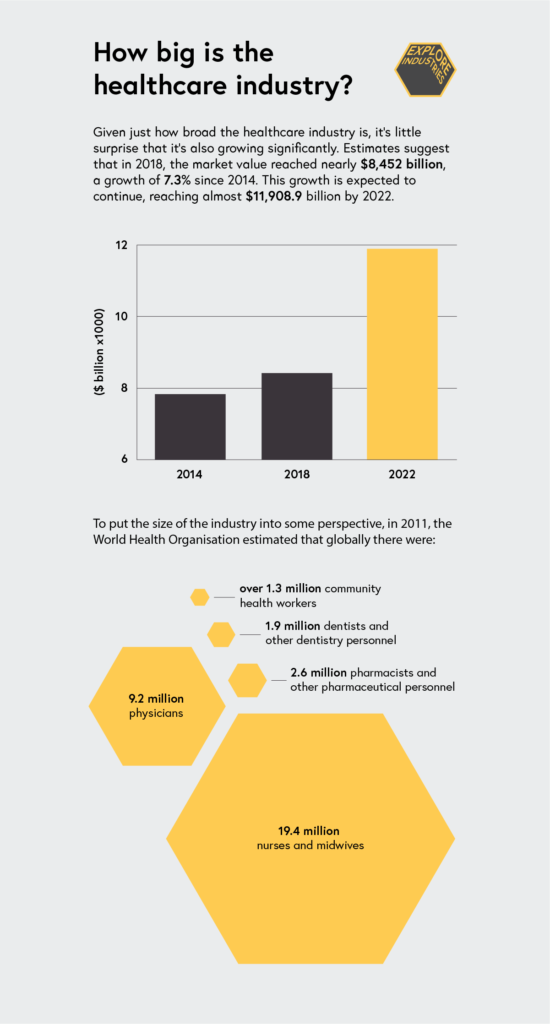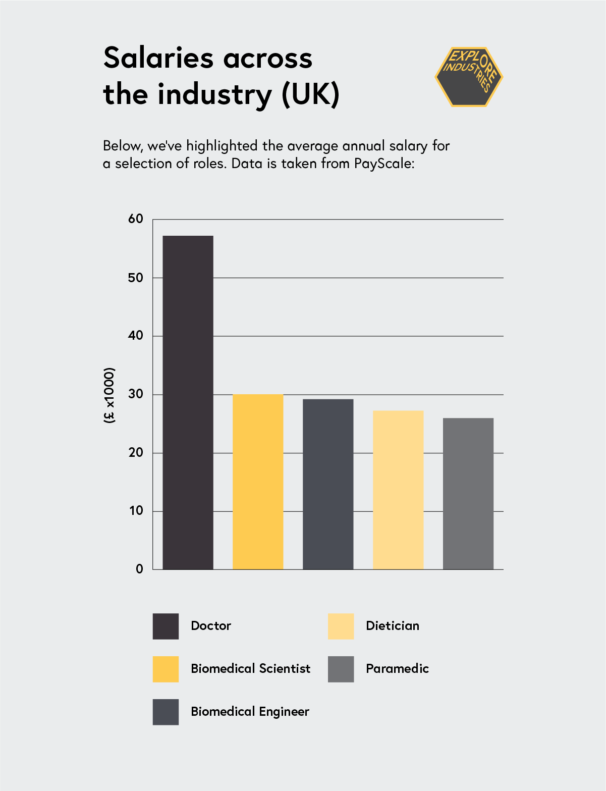Explore: the healthcare industry
We take a closer look at how the healthcare industry is faring. You’ll find everything you need to know about working in this sector, including the types of jobs available and the skills you’ll need.

The healthcare industry is a vast and varied one. It plays a central role in the lives and wellbeing of people around the world, both directly and indirectly. As this fascinating field develops, there are opportunities for professionals from all kinds of backgrounds.
We take a detailed look at this fascinating industry, examining some of the healthcare sectors, jobs, trends, and challenges. As well as exploring how current events have impacted healthcare, we also look at why you might choose a career in healthcare and how you can get started.
The global healthcare industry
Let’s start by taking a look at what we mean when we use the term ‘healthcare industry’ as well as what the current global situation looks like. It’s a good way of understanding some of the current trends and the future outlook:
What is it?
When we think of the healthcare industry, we often think of professionals such as doctors and nurses. Although these are, of course, essential roles in this field, they’re far from the only ones. The healthcare industry encompasses a wide range of sectors that provide goods and services to treat patients. This includes things such as treating people, preventing illness, and providing rehabilitative medicine and palliative care.
As well as those who directly administer healthcare, the industry also includes those who research, manage and provide essential equipment and services. Some people also expand this definition to include those who provide education, training, and regulation related to healthcare services.
Clearly, it’s a vast industry with a lot of potential when it comes to finding a career. Whether it’s helping people directly or indirectly, there is always demand across the world for people working in healthcare.
How big is the healthcare industry?
Given just how broad the healthcare industry is, it’s little surprise that it’s also growing significantly. Estimates suggest that in 2018, the market value reached nearly $8,452 billion, a growth of 7.3% since 2014. This growth is expected to continue, reaching almost $11,908.9 billion by 2022.
To put the size of the industry into some perspective, in 2011, the World Health Organisation estimated that globally there were:
- 9.2 million physicians
- 19.4 million nurses and midwives
- 1.9 million dentists and other dentistry personnel
- 2.6 million pharmacists and other pharmaceutical personnel
- Over 1.3 million community health workers
This meant that by 2017, around 33% to 49% of the world’s population was covered by essential health services. However, studies suggest that there could be a worldwide net shortage of around 15 million healthcare workers by 2030.

How has the COVID-19 pandemic impacted the healthcare industry?
As you might expect, the coronavirus pandemic has had a significant impact on healthcare industries around the world. Our medical services and personnel have been on the front lines of diagnosing, treating, and understanding the virus. What’s more, various sectors have had to quickly adapt to these unprecedented times.
The spread of the virus has affected healthcare systems in many different ways. As well as having to deal with the illness itself, the industry has many other considerations to account for, including:
- Greater risk of infection. Healthcare workers facing the brunt of the disease, meaning doctors, nurses, and other professionals were at a higher risk of catching the virus. In some countries, retired healthcare professionals were being brought out of retirement to assist.
- Shortage of equipment. Personal protective equipment (PPE) and ventilators were in high demand, particularly at the start of the pandemic. This has meant an increase in production for certain items, such as masks and gowns.
- Psychological impact. Various studies have highlighted the impacts on the mental health of healthcare professionals. Issues such as depression, anxiety, stress, and posttraumatic stress have been reported.
- Other service disruption. As healthcare systems around the world have committed resources and personnel to combat the pandemic, many other services and treatments have been delayed. This could have ongoing consequences.
- Digital healthcare. Countries around the world have had to adopt digital health technologies such as telehealth and remote monitoring to continue consultations and treatment during the pandemic. Many of these are relatively new technologies, with fields such as AI and data analytics also proving useful.
- Hiring disparity. Demand for qualified frontline healthcare professionals has skyrocketed, as has the need for those producing PPE, diagnostics, and digital healthcare. However, many non-pandemic related areas, such as orthopaedic and aesthetic sectors, have seen hiring freezes.
-

 King's College London Introduction to Nursing: The Role of Nurses Around the WorldHealthcare & Medicine
King's College London Introduction to Nursing: The Role of Nurses Around the WorldHealthcare & Medicine -

 The University of Sheffield Discover DentistryHealthcare & Medicine,Science, Engineering & Maths
The University of Sheffield Discover DentistryHealthcare & Medicine,Science, Engineering & Maths
What kinds of jobs are there in the industry?
As you’ve no doubt seen so far, there are many different types of jobs that fall within the healthcare industry. As such, the career options are numerous, even within the various sectors. However, this can make it difficult to narrow down some of the key roles, particularly given current circumstances.
If you want to get started in the healthcare industry, you’ll want to consider some of the options available to you. A good resource to help with this is the NHS careers website. Here, you’ll find over 350 different careers listed, across 15 sectors.
To get you started, we’ve highlighted some of these different areas, as well as some examples of roles that might be of interest:
Medicine roles
These are often the frontline workers who deal directly with patients in some capacity. Usually, there is a wide range of specialisation and different areas of medicine these professionals work across:
- Doctor. Doctors (or physicians) are responsible for diagnosing and treating a range of physical and mental ailments, seeing patients from the community and prescribing medication. It’s a varied role with a lot of scope for specialisation.
- Nurse. Again, nurses tend to have a fairly varied role, helping to plan and provide medical care to patients in a variety of settings. They have to liaise with doctors and other healthcare professionals, as well as administer medication, take samples, and keep records.
- Dentist. Dentists are responsible for the oral health of their patients. This includes diagnosing and treating problems, as well as performing check-ups and promoting overall dental health.
Allied health roles
This group of professions in the healthcare industry is separate from those listed above. However, they also provide a range of services that deal directly with patients:
- Dietician. Dietitians use their knowledge of science and nutrition to treat related diseases and conditions. As well as giving advice and education about nutrition, they also give personalised dietary interventions to patients.
- Paramedic. Paramedics are usually the first healthcare professionals on the scene of an emergency. As well as driving emergency vehicles, they also provide initial treatment and monitoring to casualties.
- Speech and language therapist. These professionals provide treatment, support, and care to patients who have difficulty with speaking and communication. They also help with issues related to swallowing, eating and drinking.
Research roles
A career in healthcare research focuses on expanding the scientific knowledge and understanding of topics related to medicine. As well as developing drugs and treatments, professionals in this sector look at prevention and diagnosis.
- Biomedical scientist. Biomedical scientists perform tests on samples taken by others in the healthcare industry, such as doctors and nurses. These tests help to diagnose and treat illnesses and diseases.
- Microbiologist. Microbiologists work to identify, monitor and research infectious diseases. They identify pathogens, develop and test medicines, and help to protect the community from the spread of infection.
- Toxicologist. A toxicologist explores how chemicals, materials, and potential new medicines affect humans, animals, and the environment. With this knowledge, they can advise on treatment for affected patients.
Medical technology roles
This sector is focused on developing devices and systems that help prevent, diagnose, analyse and treat diseases and illnesses. Here are some examples of roles in this field:
- Biomedical engineer. Professionals in this role spend time designing, developing, and maintaining the equipment used to diagnose and treat patients. This includes things like joint replacements or robotic surgical instruments.
- Clinical technologist. While the above role focuses on designing and developing equipment, this one is centred on the operating, maintenance, and monitoring of these devices. It’s a more practical role that may involve contact with patients.
- Information analyst. This role focuses on researching and analysing the facts and figures associated with healthcare. A large part of this job involves making sure healthcare standards are met by hospitals and other medical providers.
What skills do I need to enter the industry?
The skills and knowledge you’ll need to start a career in the healthcare industry depend greatly on the niche you choose. However, no matter which role you aspire to, you’ll require a diverse set of skills in order to thrive.
Along with the specialist knowledge needed for things like diagnosis, treatment, and research, you’ll also need a variety of other skills. As with many other careers, you’ll often need a combination of both hard and soft skills. The hard skills are often job-dependent, making them too numerous and diverse to list here. However, we have highlighted some of the attributes and abilities that can help with a career in healthcare:
Soft skills
Soft skills are those that are less quantifiable and harder to teach. They’re often the interpersonal qualities that make for good employees no matter what industry you’re in:
- Communication. The ability to effectively communicate is essential in the healthcare industry. Whether it’s with patients or other professionals, being able to convey ideas in an understandable and approachable way is vital.
- Emotional intelligence. This quality is related to a person’s ability to understand, manage, and use your emotions, as well as recognising them in others. Emotional intelligence is closely linked to empathy, which is essential when dealing with patients.
- Adaptability. The healthcare industry is often a fast-paced and changeable environment. Professionals working in this sector need to be able to adapt with these changes and take challenges in their stride.
- Collaboration. Our healthcare systems rely on a wide variety of people working together. Effective collaboration skills mean that treatment, analysis, and research are all as efficient as possible.
-

 Taipei Medical University Nutrition and Disease PreventionHealthcare & Medicine
Taipei Medical University Nutrition and Disease PreventionHealthcare & Medicine -

 University of Leeds Discovering Science: Medicinal ChemistryScience, Engineering & Maths,Healthcare & Medicine
University of Leeds Discovering Science: Medicinal ChemistryScience, Engineering & Maths,Healthcare & Medicine -

 University of Reading Small and Mighty: Introduction to MicrobiologyHealthcare & Medicine,Science, Engineering & Maths
University of Reading Small and Mighty: Introduction to MicrobiologyHealthcare & Medicine,Science, Engineering & Maths
How do salaries compare?
If you’re considering a career in the healthcare industry, you’ll likely be wondering how much certain jobs pay. As you might expect, given how varied the types of roles are, salaries tend to vary considerably. However, we’ve outlined some of the pay scales across the industry, as well as how these compare to other sectors:
Salaries across the industry
Below, we’ve highlighted the average annual salary for a selection of roles. Data is taken from PayScale:
- Doctor. £57,124
- Biomedical scientist. £30,001
- Biomedical engineer. £29,142
- Dietitian. £27,176
- Paramedic. £25,922
- Information analyst. £25,704

Salaries compared
According to some salary comparison tools, the average salary for jobs in the healthcare industry is £47,500, based on a sample size of 1,869. When compared to PayScale’s data on average NHS salaries, we see that the latter comes in at £26,722 a year.
This data also shows that neurosurgeons are, on average, paid the most, with an average annual salary of £106,978. The lowest-paying role is that of a phlebotomist, with an average annual salary of £12,421.
Why choose a career in healthcare?
When choosing a career, your salary is just one factor to consider. There are many reasons you may choose one path over another, so it’s worth knowing some of the reasons you might want to opt for a career in healthcare, including:
- To help people. Working in healthcare gives you the chance to help people every day, whether directly or indirectly. You may get to deal with patients face-to-face or develop technology and treatments that will benefit all kinds of people.
- The career prospects. There is a high demand for skilled professionals in the healthcare industry. No matter where in the world you are, you’re likely to find work in this field. There are also many defined routes for progression.
- To challenge yourself. Healthcare is a field that’s often fast-paced and changeable. This type of environment can challenge you to adapt and overcome these changes, all the while helping others.
- It’s future-proof. The healthcare industry is expected to grow over the coming years, with many areas in need of skilled workers. As you progress and learn new skills, your career will continue to develop alongside the industry.
How to get started in the healthcare industry
So, if our examination of the healthcare industry has garnered your interest, you might be wondering how to start your career in this field. Thankfully, there are several options available when it comes to getting a job in the healthcare industry. Many of these require you to build your skills, knowledge, and experience:
- Education. As you might expect, education plays an important role in starting a career in healthcare. Many positions require you to be a registered healthcare professional, which usually requires a degree. You can start by taking an online healthcare course to see which field is the right fit for you.
- Training. In the UK, the NHS Modernising Scientific Careers scheme and NHS Practitioner Training Programme combine study and workplace training. These can help you earn the qualifications you need to enter the field while gaining experience.
- Experience. For some roles, you can start at an assistant level and work your way up as you gain experience and work-based learning.
- Networking. Building your network and finding people you can learn from is an important part of developing your career in any industry. Check out our guide on how to network for more details.
Final thoughts
That concludes our detailed look at the fascinating healthcare industry. As we’ve seen, it’s a sector that is essential to the everyday lives of people around the world. As such, there is a high demand, and even a shortage, of professionals in this field.
Although the pandemic has had some fairly serious consequences for this sector, it continues to grow and adapt to the situation. With the right education, skills, and knowledge, you can kick-start your career in the healthcare industry.
-

 The University of Glasgow Introduction to Health Technology AssessmentHealthcare & Medicine
The University of Glasgow Introduction to Health Technology AssessmentHealthcare & Medicine -

 University of Leeds Communication and Interpersonal Skills at WorkBusiness & Management
University of Leeds Communication and Interpersonal Skills at WorkBusiness & Management




